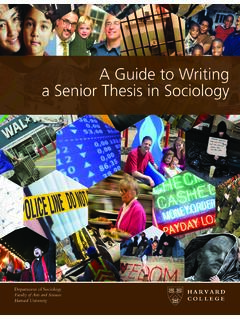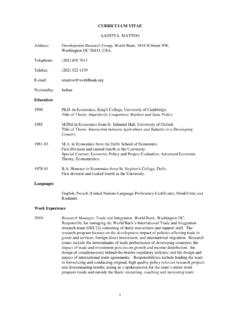Transcription of RELATIONSHIP BETWEEN GENDER, AGE, EXPERIENCE, AND ... …
1 1. RELATIONSHIP BETWEEN Age, Experience, and Student Preference for Types of Learning Activities in Online Courses Thomas A. Simonds, , , Creighton University Barbara L. Brock, , Creighton University Abstract In this study, two researchers explored student learning preferences in online courses. They used the scholarship of teaching and learning process as a research model, and embedded a web-based survey and online focus groups in the online courses they were teaching. After collecting data, the researchers conducted multiple logistic regression analyses to test their hypothesis that a RELATIONSHIP existed BETWEEN some student factors and student preferences for types of online learning activities.
2 The results of the data analysis revealed a statistically significant RELATIONSHIP BETWEEN student age and student preference for certain types of online learning activities. Older students in the study indicated a much stronger preference for videos of the professor lecturing, while younger students tended to prefer more interactive learning strategies. Focus group comments from the older students provide insights into some of the reasons why they found watching video lectures to be helpful for their learning, and comments from younger students illustrate how they learn best in online courses. The researchers offer suggestions for online instructors based on the findings of this study, and they explain why online instructors may find the scholarship of teaching and learning research process especially helpful for both teaching and research efforts.
3 Keywords: Effective Online Teaching and Learning Strategies, RELATIONSHIP BETWEEN Age and Preference for Online Learning Activities, Scholarship of Teaching and Learning INTRODUCTION. The best university instructors engage in an iterative process of honing their teaching strategies (Bain, 2004; Darden, 2003; Matchett & Main, 2010; Palmer, 1998). Are my students really 2. learning the material? Is there a better way I could teach this material? What are my students really thinking about the questions I am posing in this course? Questions like these run through the minds of university instructors and fill the air in faculty offices and conference rooms as professors search for the very best ways to help their students learn.
4 The two researchers who conducted this study had similar questions about student experiences in online courses they were teaching at a university in the United States. So they began talking to one another about their experiences of teaching online courses. As they continued the conversation and refined their questions, they realized they needed to know more about students'. experiences in their online courses to improve their teaching. In order to learn more about their students' experiences, the researchers decided to conduct this study. LITERATURE REVIEW. The researchers conducted a literature review to survey what other scholars had discovered about the RELATIONSHIP BETWEEN age, experience with online learning, and student preference for types of online learning activities.
5 The researchers searched for articles using electronic databases such as JSTOR and EBSCO, which were available to them through their university library. Several articles were also discovered by using the search engine. The results of the literature review are presented in the following paragraphs followed by a summary of the findings of the literature review. Chyung (2007) studied graduate students completing an online university course. Chyung found that older students (ages 40-57) posted more often on a discussion board than younger students (ages 22-39). But while the older students in this study were more active in the asynchronous web-based discussion board, the younger students felt more confident about their ability to learn 3.
6 In the online environment by the end of the course. Both groups of students performed equally well, on average, on the final exam. DiBiase and Kidwai (2010) conducted a mixed methods study of adult professionals (ages 22-65). and undergraduate students (ages 19-30) taking an online geography course. The researchers found that the adult professionals spent more time communicating online and spent more time logged onto the learning management system than the relatively younger undergraduate students. The adult professionals, on average, scored much higher on quizzes than the undergraduate students. Other researchers have noted that older students devote more time to the learning experience (Raidal & Volet, 2009; Vermunt & Vermetten, 2004).
7 According to these researchers, older students are more likely to go beyond what is required for a grade to explore new materials and ideas that have occurred to them as a result of their experiences in a university course. Koh and Lim (2012) studied the impact on academic performance when an online tool for collaborative work was used in a university computer science course. Students in the class ranged in age from 18 to 26 years old, and the average age of the students in the course was The researchers found that as the age of the student increased, the student's grade on the final project also increased.
8 This study lends support to the thesis that older students score higher than younger students on measures of academic performance when web-based tools are utilized in a course. Koh and Lim (2012) also studied the RELATIONSHIP BETWEEN age, academic performance, and the level of social interaction afforded by different web-based collaborative tools. As the age of the student decreased, the student's preference for tools that allowed for more online means of 4. communication increased. Younger students scored better on the assignment when they could chat online, post pictures, share biographical information, and share comments.
9 Dobbs, Waid, and del Carmen (2009) conducted a survey study of criminal justice students at a university in the United States. The researchers found that students who had taken online courses thought they learned more in online courses, had more interactions with their peers in online courses, and thought the quality of online courses was very good compared to traditional on- campus courses. Students who had not taken any online courses thought they would learn more in on-campus courses, doubted they would have many interactions with their peers online, and opined that the quality of online courses was not very good.
10 The findings of Dobbs, Waid, and del Carmen (2009) were amplified by studies conducted at Columbia University. The RELATIONSHIP BETWEEN level of experience with online learning and preference for types of learning activities was explored by researchers at the Community College Research Center (CCRC) housed at Columbia University (CCRC, 2013a, 2013b). The researchers interviewed community college students who were just beginning to take online courses and discovered that they preferred the structure and interaction of on-campus courses and found online courses to be very challenging. Now looking back at the literature reviewed in this article, two key conclusions can be made.














